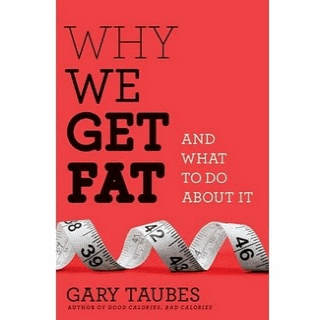Gary Taubes, a professional writer and journalist is the author of the critically acclaimed Good Calories, Bad Calories. Now his newest release, Why We Get Fat takes the long-held idea that the reason we get fat is the calories in/calories out hypothesis and debunks it. In essence, Taubes, through scores of research-backed evidence, suggests that it is not the amount of calories per se, but rather the carbohydrates in our diet that are responsible for fat accumulation.
Taubes proposes that in order to lose weight, we need to consume a very low carbohydrate diet. Protein, naturally-occuring fat, like those found in meat, poultry, fish, eggs, avocados and oils as well as leafy green vegetables should comprise the mainstay of our diet. The typical American diet of starchy carbohydrates, grains, sugar, processed food and even high glycemic vegetables and fruit needs to be given the boot if we want to avoid being overweight or obese.
Listen to an excerpt of this interview here.
In a nutshell, why do we get fat?
It’s not because we eat too much or exercise too little. Rather, the kinds of carbohydrates we primarily eat today disregulate our fat tissue.
Fat accumulation is determined by the hormonal and enzymatic regulation of fat tissue. And since the amount of fat we accumulate is fundamentally regulated by the hormone insulin, the obvious culprits for why we get fat are the carbohydrates in our diet, because, succinctly put, it’s carbs that regulate our insulin levels.
We don’t get fat because we overeat; we overeat because we’re getting fat. And the reason we get fat is because the easily digestible carbohydrates we consume, like sugar, elevate the insulin levels in our blood. And it is insulin that is responsible for the storage of fat.
Where did the science go wrong?
Before the sixties, it was well recognized that carbohydrates make us fat. The data and the research that supports this goes back to 150 years. But then the concept of dietary fat began to complicate things because of its implication in heart disease. And since fat is calorically-dense, fat became bad and carbs became good. If you’re eating a low-fat diet, then you’re eating a high carbohydrate diet. The Food Guide Pyramid is a perfect example. Carbohydrates, like grains, breads and pasta, make up bulk of the diet, but what has happened as we have adopted this approach to eating?
We have continued to become fatter and fatter.
So then idea that exercise will make us slimmer also came into play. Exercise mania begins to set in during the seventies, yet there is no scientific literature that shows exercise is necessary for weight loss. What exercise does is make you hungrier.
The science that you cite in your book and the conclusion you make are considered controversial by what we consider to be the health experts today. Do you see any movement in these health experts or leading health organizations to adopt the concepts that you are suggesting?
It’s pretty common knowledge that the high glycemic carbs, like the sugars and refined flours are not good for us. It’s also fairly common knowledge that there are good carbs and bad carbs, so what I’m saying here isn’t anything new.
But the argument that it’s not about how much you eat and how much you exercise, but in rather what you eat, is a tough battle. There are many factors that play into this including strong economic forces that are designed to keep lots of industries happy.
On the flip side, I do see more and more public health experts and researchers who are supporting this notion that weight loss is not as simple as calories in and calories out, although it’s going to take a while for the majority of health leaders to adopt this.
Science aside, what are your thoughts and suggestions for how we transform our relationship to food that we’ve come to love? Our relationship to kale is very different than what is to Cadbury chocolate or a bowl of pasta. How do you suggest we begin to transform that relationship?
The challenge is that we have all of these notions of why we get fat and why we choose to eat certain foods. For instance, you may claim to have a chocolate addiction but if you would eat 100 percent pure chocolate with no added sugar, you’ll lose that addiction pretty quickly.
First, we need to get the science right: We need to understand that certain foods are inherently fattening and and we also need to know how these foods drive fat accumulation. The injustice of it is that it’s going to be the foods we love the most.
Then we need to figure out how to break addiction and wean away from those foods. For instance, just as a nicotine patch relieves the craving for a cigarette, perhaps we need a patch that would relieve the craving for carbohydrates. So, we need to figure out what is going on then all of these other issues, emotional attachments to food, stress eating, etc., can be solved.

